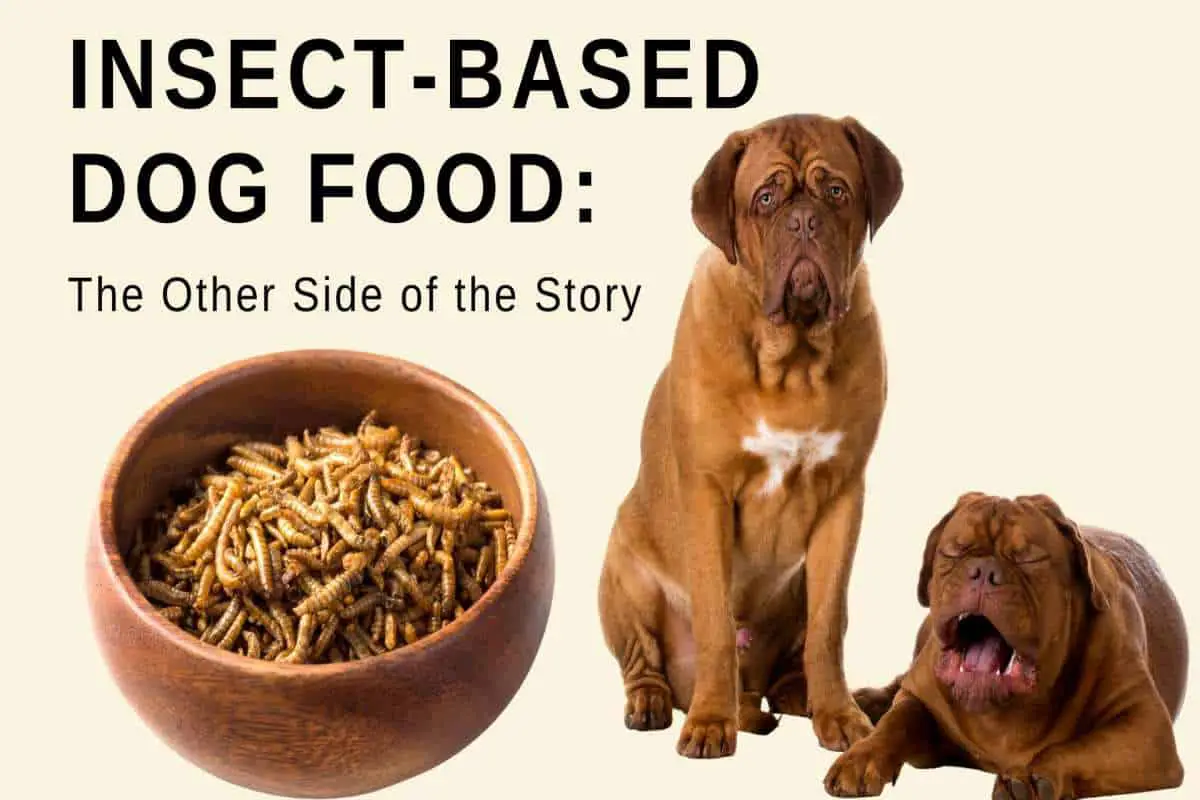Insect-Based Dog Food: The Other Side of the Story
Dog food manufacturers are leaping on the profitable trend of insect-based products touted as a hypoallergenic, sustainable protein. Black fly larvae, meal worms, crickets, cockroaches and maggots are grown and processed with limited research regarding dogs’ digestion, immune system, development of new allergies, benefits, overall health and long term safety.
Is insect-based dog food right for your dog?
A recent trend in pet food manufacturing is to use insects as a novel source of protein in dog food. Manufacturers replace traditional proteins like pork, poultry, beef and fish with black fly larvae, meal worms, crickets, cockroaches and maggots.
Proponents suggest insects are an environmentally sustainable protein option that may help some dogs with allergies. Research shows that dogs may be able to tolerate a small amount of insects (15%) as part of a whole foods diet – for a short time. An insect-based diet may temporarily help some food-related skin conditions because it mimics traditional food elimination diets. However, with limited health and environmental safety data, conscientious pet parents should educate themselves about the evidence and wait for long term feeding studies before committing to this food trend.
Are insect-based dog foods environmentally sustainable?
Supporters of insect-based dog foods claim that mass insect-rearing operations will produce less carbon and methane than traditional livestock, however there is limited scientific evidence to support this claim. Researchers caution that potential risks to biodiversity from invasive species, insufficient knowledge about disease spread and long term health and safety concerns remain unaddressed.
Although there are several environmental concerns, insects are proven to be a low-cost source of protein with an efficient feed conversion ratio. Since insects are fed agricultural waste (despite the lack of health and safety research), manufacturers save money on more costly waste management solutions.
Although insect-based food may eventually prove to be safe and beneficial to the environment, scientists have identified numerous safety concerns that still need to be addressed, including:
- potential risks to biodiversity
- potential environmental damage from introducing invasive species
- the impact of accidental release into the local environment
- insufficient knowledge about disease spread in mass-rearing operations (diseases are common among insects)
- the use of large amounts of water during processing
- unknown impact on food safety and long term health (for example, some insects contain harmful cyanide and thiamine-destroying enzymes
- the introduction of insect-based diseases into the food chain
Researchers are urging more studies and stronger evidence before widely adopting insect-based food production and warn that we must not replace one environmental problem with another.
Researchers caution that we must not replace one environmental problem with another.
Insects Consume Agricultural Waste
Insect larvae are fed rotting fruits and waste products from breweries and other production facilities, meaning that less agricultural waste enters the environment directly. This keeps feeding costs low, and enables producers of agricultural waste to sell their waste instead of developing more costly solutions for waste disposal.
Although this may appear to have environmental and economic benefits, there is a lack of safety research on whether insects can convert potentially toxic waste into a food source that is safe for livestock, dogs, and others in the food chain.
Is insect-based dog food hypoallergenic?
Insect-based pet food manufacturers are keen to label insects as “hypoallergenic” to appeal to dogs with food-based reactions like allergies, dermatitis, digestive and autoimmune illnesses. Some dogs may experience temporary relief on an insect diet, but dogs can still develop allergies to insects and other health problems over time.
Up to 62% of allergic skin disease in dogs can be linked to food sensitivities.
When dogs experience food-related symptoms like dermatitis, Holistic Vets often recommend a food elimination diet to remove offending foods. Insect-based food studies mimic these conventional food elimination diets. Since dogs have not been exposed to insects before, their immune systems may react less aggressively, leading to temporary relief of symptoms in some dogs. The same effect would likely be seen if the offending protein were replaced with bison, duck, fish or other protein new to the dog’s system.
A small study of 19 dogs with allergic dermatitis were fed an insect-based diet for 12 weeks. Although some experienced temporary relief in itching and skin lesions, the authors concurred that the same effect could likely be replicated with a traditional food elimination challenge diet. In fact, 95% of dogs on a conventional elimination diet show improvement after only 8 weeks. The authors also disclosed that the dogs continued to take immune-suppressing medications during the study. Along with other researchers, they caution that long term studies are needed and that over time, dogs can still develop food sensitivities and allergies to novel proteins like insects.
Over time, dogs can still develop food sensitivities and allergies to novel proteins like insects.
It’s important to understand that introducing a novel protein like insects does not address the underlying causes of food sensitivities. Consult a Holistic Vet to determine why your dogs’ immune system is over-reacting, and how to use nourishing food, herbs, probiotics, oils and supplements for a natural solution.
Are insects a species-appropriate food for dogs?

It’s widely accepted that our dogs’ ancestors ate a varied diet of meat, organs, bones, fish, eggs, vegetables, grasses and fruit. Although dogs were likely exposed to small amounts of pre-digested insects in their prey’s stomachs, they probably wouldn’t forage for a complete diet of insects, as some proponents of insect-based dog food claim.
Curiously, this may explain why dogs can only tolerate a low percentage of insects in their diet before their microbiology is affected. Adding a small amount of insect protein (15%) to a species-appropriate diet may be acceptable for a brief time. However, pet parents are cautioned that current studies don’t support a 100% insect-based diet, and long-term safety studies are lacking.
Is insect-based dog food safe?
There isn’t enough research to suggest that insect-based food is a safe, complete or long-term diet for dogs. Although some dogs may tolerate a small amount of insects as a temporary diet change, they may experience negative changes to digestion and gut bacteria and may still develop allergies to insect protein over time.
Although uncommon, researchers have reported cases of dogs that have had negative reactions to insect-based food:
- allergies and excessive immune reaction
- systemic infections
- food-related skin itching (cutaneous adverse food reactions)
- changes to gut flora and microbiology
Contamination
High levels of heavy metals have been detected in some insect-based food, such as cadmium and arsenic. Mycotoxins do not seem to accumulate, but residues of pesticides, drugs, hormone, dioxins, PCBs and harmful bacteria have been found.
Can dogs tolerate an insect-based diet?
Short-term studies have shown that many dogs cannot tolerate an insect-based diet as their complete source of protein. One study found that dogs fed a diet composed of more than 15% insects experienced negative changes in their digestion and fecal bacteria.
Dogs who were fed maggots also showed a small but undesirable change in gut bacteria.
Pet parents who wish to introduce insect-based food to their dogs are cautioned against making insects more than 15% of their dog’s diet.
Some insect food proponents cite a preliminary study that suggests insects may be more digestible than deer by-products. Researchers were unable to explain this conclusion, however rendered and diseased animals used as by-products may have higher collagen levels that impact measures of digestibility.
Lack of Long Term Safety Data
No long term health and safety studies have been conducted on dogs fed an insect-based diet. Livestock fed insect-based diets show vast differences in digestion and growth, based on the type of insect they are fed, but similar studies on dogs is limited. Researchers also warn that insect-based food may lead to the development of insect allergies over time.
Researchers warn that the benefits seen in other animals fed an insect-based diet have not yet been demonstrated in dogs, so caution is warranted.
What’s in insect-based dog food?

Dog food manufacturers use crickets, black fly larvae, mealworms, maggots, cockroaches, slugs and other insects as a source of protein, fat, minerals and amino acids. Some manufacturers use insects as a complete protein source, while others supplement protein requirements by adding animal meal (renderings). Dog food products often include genetically modified grains, animal meal (renderings), fillers, synthetic vitamins, artificial flavors, salt and rendered fat.
The chemical composition and nutritional value of insects meets minimum requirements, but is diverse and inconsistent, depending on:
- the type and gender of the insect
- the stage of development
- the insect’s diet
- how the insect was processed and stored
Insects are already embedded in our food chain and fed to poultry, swine and salmon. Dog and human food products are on the market, yet long term safety and environmental evidence is largely non-existent.
How are insects raised and processed for dog food?
Insect larvae are fed with agricultural waste and brewery by-products. Insects are then toasted, boiled, ground up, microwaved, frozen or asphyxiated. Processing disrupts the quality and availability of the protein, leading to sub-optimal digestion in our dogs’ stomachs. Because an insect’s stomach cannot be removed prior to processing, their own unique gut bacteria cannot be guaranteed for microbiological safety.
Storing processed insects in plastic containers, and certain refrigeration conditions will also degrade the quality of fatty acids, which are essential to good health.
FAQs
What can I do for my dog with food sensitivities?
If your dog has food sensitivities or food-reactive conditions, consult a Holistic Vet. A proper elimination diet will often help along with detoxing, omega-3s, clean meats, fresh vegetables, probiotics, medicinal herbs, safe shampoos and a low-stress environment.
Is insect-based dog food ethical?
Processing insects can be seen as a kinder practice than slaughtering larger, vertebrate animals. Although insects are still killed during processing, most people are less concerned about their welfare. However, since long term safety studies on dogs’ health and environmental impacts are lacking, the ethics of this profitable trend should be carefully considered.
Do dogs like the taste of insects?
Insect-based kibble is typically sprayed with rendered animal fat to make it more palatable for dogs. If more insects in the back yard tasted like chicken fat, our dogs might be out digging and foraging for these tasty treats, instead of simply chasing them for fun.
Curiously, researchers have looked into what types of insects dogs may tolerate. They suggest that dogs prefer black fly larvae over other insects. Other studies propose that female dogs prefer cockroaches, while male dogs had more of a taste for mealworms. What we don’t know is whether dogs were able to choose from other traditional forms of meat or how hungry they were when they made these food choices.
Be kind to all living beings. Respect the earth we share. 







